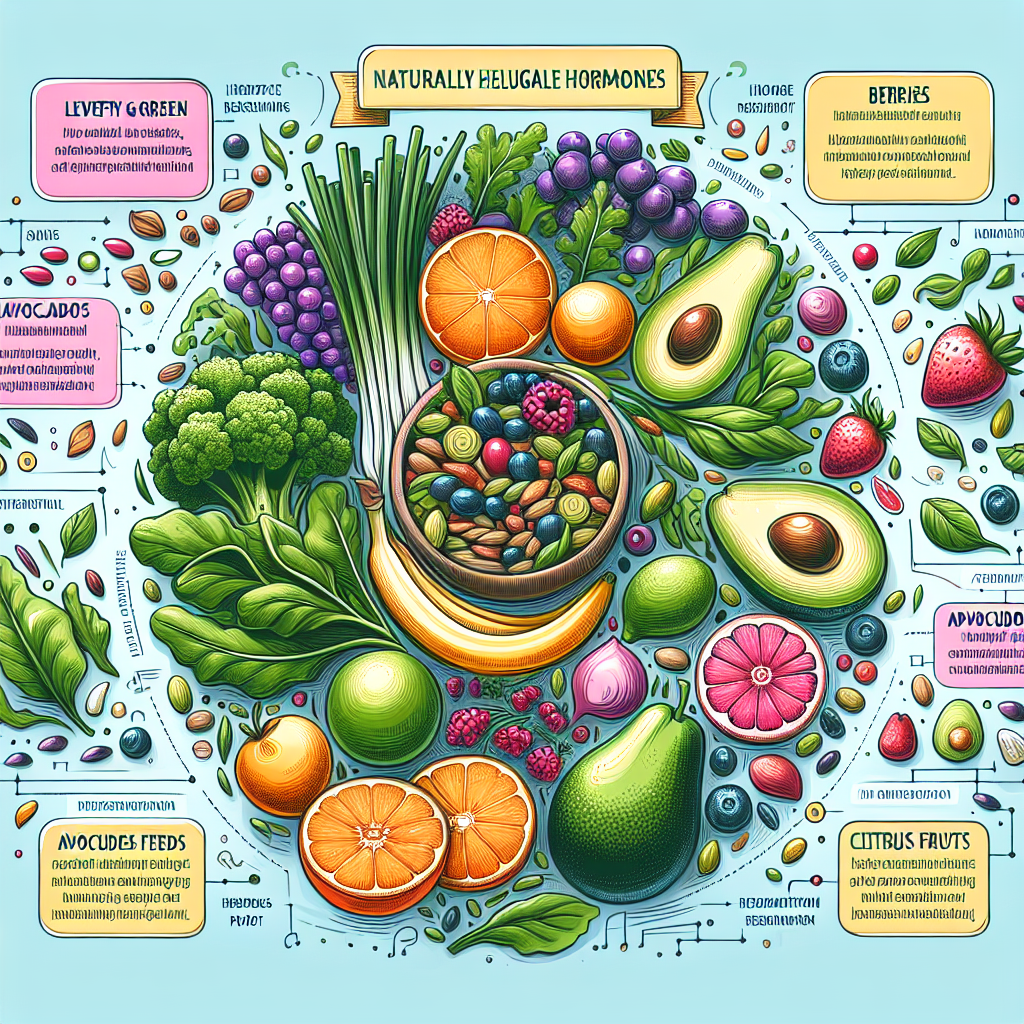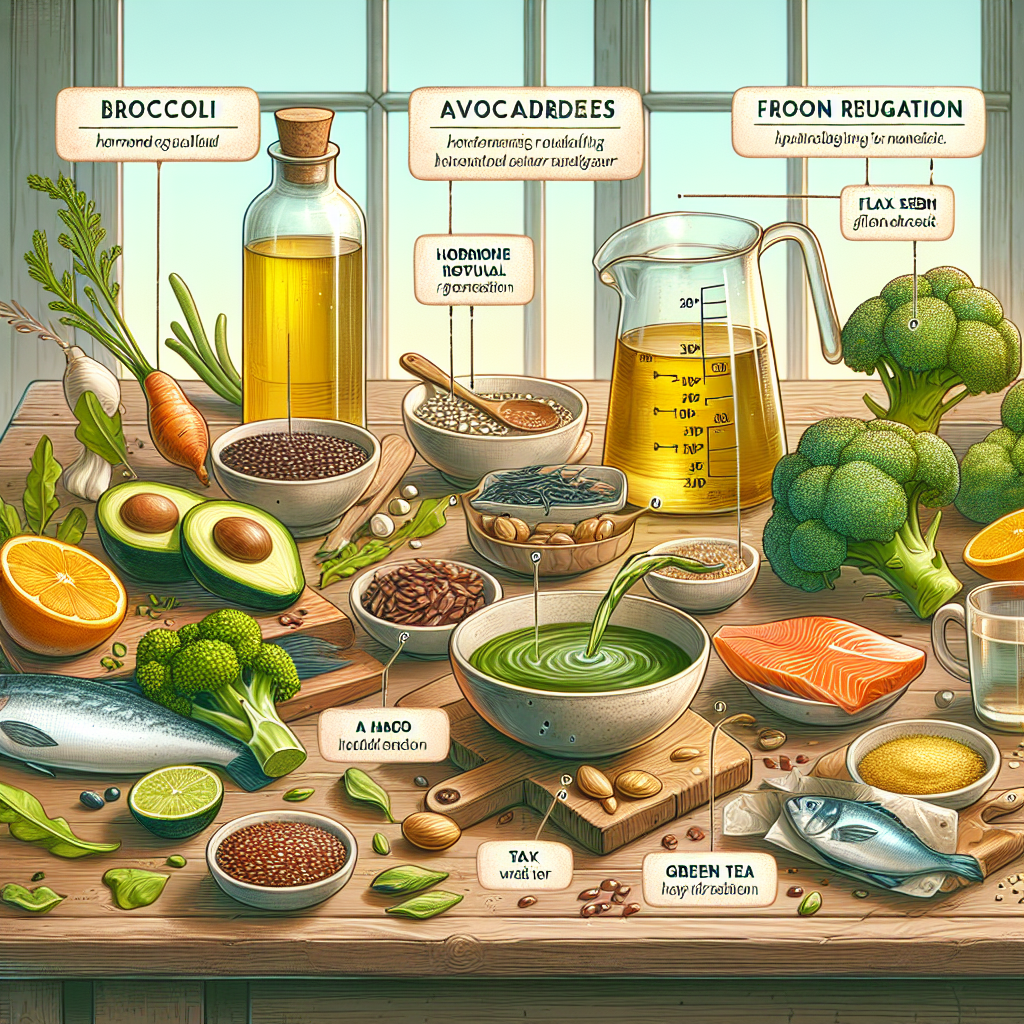Foods That Naturally Help Regulate Your Hormones

Discover the power of foods that naturally help regulate your hormones! Learn more about these beneficial foods and how to incorporate them into your diet for optimal health. Don’t wait, start your journey to hormonal balance today. Click here to get started.
Top 10 Foods for Naturally Balancing Your Hormones
Hormones are the body’s chemical messengers, playing a pivotal role in controlling your appetite, weight, and mood, among other things. When your hormones are in balance, your body hums along like a well-tuned engine. However, modern lifestyle factors such as stress, poor diet, and lack of exercise can throw your hormones out of whack, leading to a host of health problems. Fortunately, certain foods can naturally help regulate your hormones. Here are the top ten foods for naturally balancing your hormones.
Firstly, avocados are a powerhouse of nutrients, including monounsaturated fats, fiber, vitamin B5, and potassium, all of which support healthy hormone production. They also contain plant sterols that can help balance estrogen and progesterone levels. Secondly, flaxseeds are rich in lignans, a type of phytoestrogen that can help regulate estrogen levels in the body. They also contain omega-3 fatty acids, which are essential for hormone production.
Thirdly, broccoli and other cruciferous vegetables contain a compound called indole-3-carbinol, which helps to balance estrogen levels. They also support liver detoxification, which is crucial for hormone balance. Fourthly, fatty fish like salmon and mackerel are rich in omega-3 fatty acids, which are essential for hormone production. They also contain vitamin D, which plays a crucial role in hormone synthesis.
Fifthly, quinoa is a complete protein, meaning it contains all nine essential amino acids that the body cannot produce on its own. These amino acids are the building blocks of hormones. Quinoa is also rich in magnesium, which supports hormone balance. Sixthly, eggs are a great source of protein and healthy fats, both of which are essential for hormone production. They also contain choline, which is crucial for brain health and hormone synthesis.
Seventhly, pomegranates have been used for centuries in traditional medicine to treat hormonal imbalances. They contain a unique compound called punicic acid, which can help lower cortisol levels and balance the stress hormones. Eighthly, turmeric contains a compound called curcumin, which has been shown to support hormone balance. It can help reduce inflammation, which is often linked to hormonal imbalances.
Ninthly, Greek yogurt is rich in probiotics, which are beneficial bacteria that can help balance your gut microbiome. A healthy gut microbiome is essential for hormone balance, as it influences the production and regulation of hormones. Lastly, but certainly not least, dark chocolate is rich in magnesium, which supports hormone balance. It also contains phenylethylamine, a compound that can boost endorphins and serotonin, the hormones that make you feel happy and content.
In conclusion, incorporating these foods into your diet can help naturally regulate your hormones. However, it’s important to remember that diet is just one piece of the puzzle. Regular exercise, adequate sleep, and stress management are also crucial for maintaining hormonal balance. Always consult with a healthcare professional before making any major changes to your diet or lifestyle. Remember, a balanced diet is not about restriction, but about nourishing your body with the nutrients it needs to function optimally.
Exploring the Hormone-Regulating Benefits of Certain Foods

Hormones are the body’s chemical messengers, playing a pivotal role in regulating most major bodily functions, from hunger and heart rate to mood and stress levels. When our hormones are in balance, we feel energized, focused, and in good health. However, when they’re out of balance, it can lead to a myriad of health issues, including weight gain, mood swings, and even chronic diseases. Fortunately, certain foods can naturally help regulate your hormones, promoting overall health and well-being.
Firstly, let’s delve into the world of fatty fish. Rich in omega-3 fatty acids, fatty fish like salmon, mackerel, and sardines are not only heart-healthy but also beneficial for hormone regulation. Omega-3 fatty acids can reduce levels of the stress hormones cortisol and adrenaline, promoting a sense of calm and relaxation. Moreover, they can also help regulate insulin levels, which is crucial for blood sugar control and weight management.
Next on our list are cruciferous vegetables such as broccoli, cauliflower, and Brussels sprouts. These vegetables are rich in a substance called indole-3-carbinol, which helps regulate estrogen levels. High estrogen levels can lead to weight gain, mood swings, and other health issues. By incorporating cruciferous vegetables into your diet, you can help keep your estrogen levels in check.
In addition to fatty fish and cruciferous vegetables, flaxseeds also deserve a special mention. These tiny seeds are packed with lignans, a type of phytoestrogen that can help balance estrogen levels in the body. Flaxseeds are also rich in dietary fiber, which can help regulate insulin levels and promote gut health, further supporting hormone balance.
Furthermore, avocados are another hormone-regulating superfood. They are rich in monounsaturated fats, which can help lower bad cholesterol levels and increase good cholesterol levels. This can help regulate the hormone leptin, which plays a key role in appetite and weight control. Avocados are also rich in fiber and magnesium, both of which can help regulate insulin levels.
Lastly, let’s not forget about probiotic-rich foods like yogurt, kefir, and fermented vegetables. Probiotics are beneficial bacteria that can help balance your gut microbiome, which is closely linked to hormone regulation. A healthy gut microbiome can help regulate hormones like insulin, ghrelin, and leptin, promoting blood sugar control, appetite regulation, and weight management.
In conclusion, incorporating hormone-regulating foods into your diet can be a natural and effective way to support your hormonal health. From fatty fish and cruciferous vegetables to flaxseeds, avocados, and probiotic-rich foods, these foods offer a wealth of health benefits, including hormone regulation. However, it’s important to remember that diet is just one piece of the puzzle. Regular exercise, adequate sleep, and stress management are also crucial for maintaining hormonal balance. As always, it’s best to consult with a healthcare professional before making any major changes to your diet or lifestyle.
The Role of Diet in Hormone Regulation: Key Foods to Include
Hormones are the body’s chemical messengers, playing a pivotal role in regulating nearly every physiological process, from metabolism to mood. They are produced by various glands in the body, including the thyroid, adrenal, and pituitary glands. However, factors such as stress, lack of sleep, and poor diet can disrupt hormonal balance, leading to a host of health issues. Fortunately, certain foods can naturally help regulate your hormones, ensuring they function optimally.
Firstly, let’s consider the role of healthy fats. Fats are essential for hormone production, particularly the hormones responsible for regulating inflammation and metabolism. Avocados, for instance, are rich in monounsaturated fats, which can help increase the production of hormones that control hunger and fullness. Similarly, fatty fish like salmon and mackerel are packed with omega-3 fatty acids, known to reduce inflammation and help regulate stress hormones.
Next, we turn our attention to protein, a macronutrient that influences the release of hormones that control appetite. Consuming adequate protein at each meal can increase levels of the hormone ghrelin, often referred to as the ‘hunger hormone’, which signals to your brain that you’re full. Foods high in protein include lean meats, dairy products, eggs, and legumes.
Fiber-rich foods also play a significant role in hormone regulation. Fiber aids in the slow digestion of food, which can help regulate the release of insulin, a hormone that controls blood sugar levels. This can prevent spikes and crashes in blood sugar, which can lead to mood swings, fatigue, and other symptoms of hormonal imbalance. Foods high in fiber include fruits, vegetables, whole grains, and legumes.
Moreover, consuming foods rich in antioxidants can help protect the body’s cells from damage and reduce inflammation, which can lead to hormonal imbalances. Berries, dark chocolate, nuts, and green tea are all excellent sources of antioxidants.
Cruciferous vegetables such as broccoli, cauliflower, and Brussels sprouts are also beneficial for hormone regulation. They contain a compound called indole-3-carbinol, which helps regulate estrogen, a hormone that plays a crucial role in reproductive health.
Lastly, probiotic foods can help maintain a healthy gut, which is essential for hormone regulation. The gut produces and secretes various hormones that play a role in appetite regulation, mood, and sleep. Probiotic foods like yogurt, kefir, and fermented foods can help maintain a healthy gut microbiome, promoting optimal hormone production and regulation.
In conclusion, diet plays a significant role in hormone regulation. Incorporating foods rich in healthy fats, protein, fiber, antioxidants, and probiotics into your diet can help maintain hormonal balance, promoting overall health and well-being. However, it’s important to remember that while diet is a crucial component of hormone regulation, other lifestyle factors such as regular exercise, adequate sleep, and stress management are equally important. Therefore, a holistic approach that includes a balanced diet and a healthy lifestyle is the key to optimal hormone regulation.